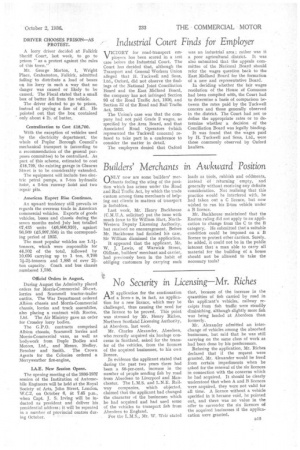industrial Court Finds for Employer V ICTORY for road-transport employers has
Page 25

If you've noticed an error in this article please click here to report it so we can fix it.
been scored in a test case before the Industrial Court. The Court has decided that, although the Transport and General Workers Union alleged that H. Tuckwell and Sons, Ltd., Oxford, did not observe the findings of the National Joint Conciliation Board and the East Midland Board, the company has not infringed Section 93 of the Road Traffic Act, 1930, and Section 32 of the Road and Rail Traffic Act, 1933,
The Union's case was that the company had not paid Grade 2 wages, as specified by the Area Board, and that Associated Road Operators (which represented the Tuckwell concern) refused to take part in a conference to consider the matter in detail.
The employers denied that Oxford was an industrial area ; rather was it a poor agricultural district. It was also submitted that the appeals committee of the National Board should refer the wages question back to the East Midland Board for the formation of a new and representative Board.
In deciding whether the fair wages resolution of the House of Commons had been complied with, the Court had to determine a basis of comparison between the rates paid by the Tuckwell concern and those generally observed in the district. The Court had not to define the appropriate rates or to determine whether a decision of the Conciliation Board was legally binding.
It was found that the wages paid by H. Tuckwell and Sons, Ltd., were those commonly observed by Oxford hauliers.




















































































